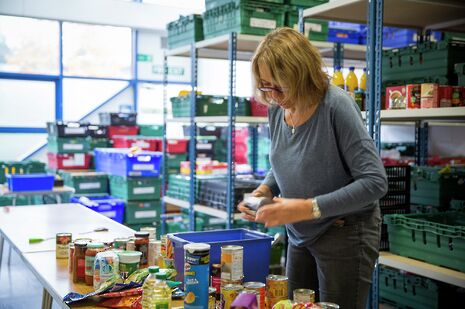Last year saw soaring use of Cambridge foodbanks
Figures show a 17% increase in foodbank use from December 2017 to 2018, part of a general trend of the increasing use of foodbanks in Cambridge

Last December saw around 1,050 receive food parcels from foodbanks in Cambridge, according to estimates from Cambridge City Foodbank, an organisation which has eight Foodbank Distribution Centre locations across Cambridge. This was an increase of 17% from December 2017, when 896 people visited Cambridge foodbanks.
The average number of people visiting foodbanks between January and October in 2018 was 680, with November seeing a rise to 837 users.
“We generally see a peak in visits during December as cold weather sets in and people are worried about having no food during the holiday time when little other support is available,” said Jon Edney, foodbank coordinator for Cambridge City Foodbank.
Foodbank use in Cambridge has grown every year since 2015, with about 8,600 people using foodbanks in 2018 compared to 6,458 in 2017 – a 34% increase. This increase is significantly higher than increases in national foodbank use, which is 13%.
Mr Edney linked increases in foodbank use to the erosion of benefits in real terms, but added that: “a major factor is low income and insecure employment. The most frequent reason now given for people needing the foodbank is low income.”
He added that the Cambridge-specific increase in foodbank use is “probably linked to the high cost of housing in Cambridge and poor growth in wages.”
“People in low-income situations live on a cliff edge so a small negative impact on their financial situation can result in a disproportionately high increase in foodbank use.”
The introduction of Universal Credit last October saw concerns about the increasing use of foodbanks. Mr Edney commented that “the foodbank is seeing a lot of people who are facing issues with Universal Credit”, which was introduced in Cambridge last October but that it was “too early to assess the overall impact”.
The Cambridge University Foodbank Society, which aims to increase foodbank donations from Cambridge students and the University and reduce food waste, commented: “It is a tragedy that, in one of the richest cities in the UK, so many families have had to rely on foodbanks this Christmas. These stories are often invisible to use in the student bubble, but they play out all year round.”
Foodbank donations are encouraged by Cambridge City Foodbank, although Mr Edney was keen to point out that “we do ask students not to empty the contents of their food cupboards into the foodbank bin at the end of term without checking expiry dates and the suitability of the items for regular families who need nutritious food”, adding that the most needed items were listed on the organisation’s website.
Whilst Mr Edney said that the increasing demand for foodbank parcels has “place[d] significant strain on [foodbank] volunteers”, he noted that most Cambridge students would not be able to consistently volunteer at Cambridge foodbanks throughout the year, and so said the most important way for Cambridge students to help is “by raising awareness of poverty as a long term issue that needs to be addressed both by government and the private sector – especially in supporting fair wage initiatives.”
The CU Foodbank Society echoed this sentiment, stating that “most of the underlying issues around foodbank use require political solutions.”
“Student support for the foodbank and other charities is vital, but we should also demand action from local and national politicians to tackle problems like chronic poverty, high rents and inadequate social security.”
Daniel Zeichner, MP for Cambridge, said: "The recent sharp increase in foodbank demand is worrying, especially as it cannot be explained simply by the usual rise in use at Christmas… Cambridge is an expensive city in which to live and wages have been stagnant in recent years, but I believe that the underlying cause of rising foodbank use is the long-term consequence of the callous welfare policies that have been pursued by this Government and the Coalition Government since 2010, and the cutting of many key preventative and support services."
He added: "Governments are meant to devise policies that support people when times get tough, not create a situation where working people have to rely on the generosity of their local communities to be able to feed their families. It is simply unacceptable. This Government needs to take a hard look at their obsession to cut welfare support and realise it is them causing misery for communities up and down this country."
 News / Judge Business School advisor resigns over Epstein and Andrew links18 February 2026
News / Judge Business School advisor resigns over Epstein and Andrew links18 February 2026 News / Hundreds of Cambridge academics demand vote on fate of vet course20 February 2026
News / Hundreds of Cambridge academics demand vote on fate of vet course20 February 2026 News / Petition demands University reverse decision on vegan menu20 February 2026
News / Petition demands University reverse decision on vegan menu20 February 2026 News / CUCA members attend Reform rally in London20 February 2026
News / CUCA members attend Reform rally in London20 February 2026 News / Gov grants £36m to Cambridge supercomputer17 February 2026
News / Gov grants £36m to Cambridge supercomputer17 February 2026










